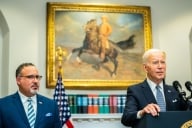You have /5 articles left.
Sign up for a free account or log in.
Let me start by saying that I'm tremendously conflicted on this subject. Probably the first lessons I taught my children when they were old enough to watch TV were that (1) commercials lie, and (2) lots of kids' shows are just half-hour commercials. Pure selling is not something I'm good at, or that I enjoy, or that I can respect in anything but the most cynical manner.
At the same time, explaining (as opposed to selling) sustainability doesn't seem to be working too well at a societal level. I'd love to believe that the majority of my fellow citizens would respond appropriately to a factual description of the need for sustainable behaviors, but . . . come to think of it . . . I haven't heard the term "American citizen" too much lately. What I continually hear about is the "American consumer". To citizens, you can explain. Consumers (almost by definition) need to be sold. And, while those of us committed to sustainability have been explaining our little hearts out, fossil fuel proponents have been selling the ground right out from under us. According to recent polling data, they're succeeding. So, with considerable reluctance, I'm becoming convinced that we've got to work smarter.
As it happens, I've also recently become more aware of an organization called ecoAmerica. I mean, I've been peripherally aware of them for a couple of years; they're one of the three organizations (with AASHE and Second Nature) that put together the Presidents Climate Commitment. But I never really knew what they did. Turns out, they operate where sustainability meets marketing. They've been ahead of me (and probably a lot of other people) for a couple of years or more.
It's my review of ecoAmerica's materials that started me thinking seriously about slogans. Slogans that sell stuff are bad, because they do their work by convincing folks that material goods are going to improve their lives in significant if intangible ways. But slogans which are designed specifically to sell intangibles -- ideas -- might not be objectionable on the same level. At least, not if they work.
Two of ecoAmerica's recent projects definitely got my attention. The first is a climate communications research study titled "Climate and Energy Truths: Making the Necessary Connection." It's a must-read (and far shorter than that German report!). I'm still absorbing its message, and figuring out how to put it to use here at Greenback.
The second project that intrigues me is the American Climate Values Survey -- a psychographic research study aimed at understanding how Americans think about climate, what core social values shape their conclusions, and how we can best deliver our message of sustainability. Most exciting, the authors have designed and tested some sustainability messages that outperform (in terms of selling, convincing, converting, reshaping, whatever you want to call it) the core message of the fossil fuel proponents. With apologies to ecoAmerica and SRI Business Intelligence (who conducted the survey for them), the draft message I've cobbled together goes something like this:
The best way to bring jobs and prosperity back to this country is also the best way to end our dependence on foreign oil and protect the Earth we leave our children: to build things in America again, starting with wind turbines, solar panels, and energy-efficient products that say “Made in America.”
We need our leaders – elected officials, researchers, educators – to partner with business to develop innovative energy technologies that will recharge our economy and create millions of jobs.
We shouldn’t be losing ground in the world economy, building up massive trade deficits to pay for foreign oil.
It’s time that we commit ourselves as a nation to developing clean, safe energy from the sun, wind and other natural sources that will create millions of jobs and rebuild our manufacturing base.
The USA has led every technological revolution of the last two centuries – electricity, railroads, the telephone, automobiles, television, computers – and there’s no reason we can’t lead this one.
It’s time to harness the greatest source of power we have in this country: American ingenuity.
I don't know that it's going to work. I don't even know, for sure, that I'm on the right track. I just know that what I (we) have been doing for the past few years hasn't been working well enough and -- according to at least some results -- seems to be working even less well in recent times. I'm hoping that a reframing of the sustainability issue will help us to get through to students, parents, administrators, faculty, and the general public.
Who knows? Maybe we can even make it into a TV commercial.





